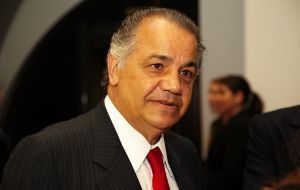MercoPress. South Atlantic News Agency
Brazil’s Bovespa monopoly on the line as government considers boosting competition
 CEO Edemir Pinto said Bovespa working to integrate its clearing operations to lower margin requirements by up to 40%
CEO Edemir Pinto said Bovespa working to integrate its clearing operations to lower margin requirements by up to 40% Brazil’s stock exchange Bovespa is facing a loss in market share estimated at as much as 30% by HSBC Holdings Plc and Banco Itau BBA SA as the nation considers boosting competition among trading platforms.
BM&FBovespa fell 12% in the five days through Wednesday to a two-week low on concern surging trading in the world’s second-largest emerging market will lure rivals. As the only exchange in Brazil, BM&FBovespa has benefited from daily trading volumes that have climbed 50% in the past five years to a 100-day average of 4 billion dollars. That compares with a 49% drop in the period for the top exchanges in the world’s 10 biggest stock markets.
Securities regulators will meet with market participants in July to discuss competition after commissioning a report that found opening up the market would reduce transaction costs by as much as 8.1%. The report, released this week, bolsters bids by Direct Edge Holdings LLC, Bats Global Markets Inc., Cetip SA-Mercados Organizados and IntercontinentalExchange Inc. (ICE) to compete against BM&FBovespa.
“With more competition, BM&FBovespa’s market share will fall, hurting its growth outlook,” Paulo Ribeiro, an analyst at HSBC, said in a telephone interview from Sao Paulo.
Ribeiro, who has the equivalent of a buy recommendation on BM&FBovespa, expects competition to start in 2014, with outside providers capturing 30 percent of equities trading by 2016. Itau analysts including Regina Longo Sanchez expect BM&FBovespa may lose 20 to 30 percent of its share, according to a June 18 research note. Itau has the equivalent of a hold recommendation on the stock.
BM&FBovespa, based in Sao Paulo, said it will discuss the report’s findings with Brazil’s securities regulator, known as CVM, before making comments on the issue, according to an e- mailed statement from the exchange’s press office.
The Sao Paulo exchange is working to integrate its clearing operations to lower margin requirements by up to 40%, which could help the exchange fend off potential competition, Chief Executive Officer Edemir Pinto said in an interview. The bourse said in a statement on its website that trading fees in Brazil are in line with other countries.
BM&FBovespa’s shares in Sao Paulo have lost 1.5% this year, while Bolsa de Valores de Colombia has jumped 10% in Bogotá and Mexico’s Bolsa Mexicana de Valores SAB has surged 17%. The Brazilian stock trades at 17.8 times its reported earnings, which compares with a ratio of 19.3 for the Colombian bourse and 20 for Mexico’s exchange.
While growth in trading volumes slowed to 2% in 2011 from 22% a year before amid concern about the outlook for the global economy, Brazil still offers attractive opportunities for foreign exchange operators, Ribeiro said. Foreign investors pulled 1.35 billion Reais (655 million dollars) from the Bovespa in 2011, which compares with an inflow of 5.96 billion Reais in 2010, according to data from the exchange.
Ending BM&FBovespa’s monopoly would help spur economic growth, Oxera Consulting Ltd. said in the report commissioned by the CVM and released on June 18.
While the regulator says in a statement on its website the findings don’t necessarily reflect its views on the issue, the report will help it decide if a regulatory change is needed to deal with increased competition. BM&FBovespa is the second-largest exchange operator in the Americas after Chicago-based CME Group Inc., which owns a minority stake in the Brazilian bourse.
While the end of BM&FBovespa’s monopoly would likely drive trading fees lower, the impact on the company’s revenue should be offset by rising trading volumes, said HSBC’s Ribeiro.




Top Comments
Disclaimer & comment rules-

Read all commentsA dinosaur just waking up to the real world.
Jun 23rd, 2012 - 03:42 pm 0Why did they not take the initiative themselves: because, like in ALL government, and to a lesser extent private, monopolies they pad out the lazy workforce and have senior management who are happy to keep their own remuneration as high as can be milked from the customer.
Shortly, the customer will have a choice at last. Watch this outfit reap the 'benefit' of overcharging companies for years.
If these companies have any sense they will drop them like a hot potato, and serves them right.
Commenting for this story is now closed.
If you have a Facebook account, become a fan and comment on our Facebook Page!